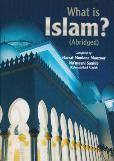What is Islam - eBook
Through wahi (divine revelation), Rasulullah (sallallahu ‘alaihi wasallam) was informed of a trade caravan of the Quraish heading towards Makkah Mukarramah. Therefore, in the month of Rabee’-ul-Awwal or Rabee’-us-Saani in the year 2 A.H. Rasulullah (sallallahu ‘alaihi wasallam) set out in the direction of Bawaat with at least two hundred Mujaahideen. The purpose of this expedition was to launch an attack against this trade caravan.
Sariyyah of Hazrat Sa’d bin Abi Waqqaas (radhiyallahu ‘anhu) and the Expedition of Abwaa
Written by user2In the month of Zul-Qa’dah, during the first year of hijrah, Rasulullah (sallallahu ‘alaihi wasallam) despatched an infantry group (a group of foot-soldiers) comprising of twenty Muhaajireen under the command of Hazrat Sa’d bin Abi Waqqaas (radhiyallahu ‘anhu) to Kharraar.
This infantry group would hide during the day and travel at night. When they reached the valley of Kharraar, they learnt that the Qurayshi caravan (that they were pursuing) had already left. This group then returned to Madinah Munawwarah.
Sunnats and Aadaab of Business and Dealings – Part Eight
Written by user213. It is not permissible for one to get involved in interest bearing transactions. Giving and taking interest are both haraam in Islam.
وَأَحَلَّ اللهُ الْبَيْعَ وَحَرَّمَ الرِّبٰوا
And Allah has permitted trade and prohibited riba – interest. [1]
الَّذِيْنَ يَأْكُلُوْنَ الرِّبٰوا لَا يَقُومُوْنَ إِلَّا كَمَا يَقُوْمُ الَّذِيْ يَتَخَبَّطُهُ الشَّيْطٰنُ مِنَ الْمَسِّ
Those who consume interest will rise (on the Day of Qiyaamah) like the one who has been afflicted by the evil touch of Shaitaan. [2]
فَإِنْ لَّمْ تَفْعَلُوْا فَأْذَنُوْا بِحَرْبٍ مِّنَ اللهِ وَرَسُوْلِهِ
“If you do not do so (desist from dealing in interest) then be prepared to wage war against Allah and His Rasul (sallallahu ‘alaihi wasallam).” [3]
Sariyyah of Hazrat Ubaidah bin Haarith (radhiyallahu ‘anhu)
Written by user2Eight months after the Hijrah, during the month of Shawwaal in the first year of the hijrah, Rasulullah (sallallahu ‘alaihi wasallam) despatched a contingent of sixty or eighty Muhaajireen, mounted on conveyances, under the commandership of Hazrat Ubaidah bin Haarith (radhiyallahu ‘anhu) towards Raabigh. In this contingent, there were no Ansaari Sahaabah present.
When they reached Raabigh, they had a confrontation with two hundred Quraishi mounted cavalry. However, no actual fighting took place. Only Hazrat Sa’d bin Abi Waqqaas (radhiyallahu ‘anhu) launched a single arrow against the enemy. This was recorded as the first arrow to be fired in the history of Islam.
This chapter deals with the unparalleled sacrifices of the Sahaabah (radhiyallahu ‘anhum) in the path of Allah Ta‘ala, and the execution of those evil enemies who rebelled against Allah Ta‘ala in the various military campaigns.
When the divine commandment of jihaad was revealed, Rasulullah (sallallahu ‘alaihi wasallam) commenced fighting and jihaad, and despatched armies to various regions.
In the terminology of the Ulama of Seerah, the battle in which Rasulullah (sallallahu ‘alaihi wasallam) himself participated is referred to as a “ghazwah’ (the plural of which is ghazawaat), while the expedition in which he did not personally participate is referred to as a “sariyyah’ (the plural of which is saraayaa).
The Ordainment of Salaatul Adhaa, Qurbaani, Durood Shareef and Zakaat
Written by user2Salaatul Adhaa and Qurbaani
In the same year (the year 2AH), Qurbaani and the Salaah of Eid-ul-Adhaa were made obligatory. The following verse was revealed in this regard:
فَصَلِّ لِرَبِّكَ وَانْحَرْ
“So perform salaah (of Eid) for your Lord and slaughter (i.e. perform Qurbaani).” (Surah Kauthar v. 2)
Hazrat Hasan Basri (rahimahullah) says, “This verse makes reference to Salaatul Adhaa (Eid-ul-Adhaa Salaah) and to Qurbaani.”
Sunnats and Aadaab of Business and Dealings – Part Seven
Written by user212. Once the sale is concluded, neither the purchaser nor the seller has the right to unilaterally cancel the sale.[1] However, if the customer wishes to return the purchased item and cancel the sale, it will be greatly rewarding for the seller to cancel the sale and give him a full refund.
5. Make at least one khatam of the Quraan Majeed in Makkah Mukarramah. Insha Allah, you will receive the reward of 100 000 khatams.
6. Remember all those who did some ihsaan (good) to you and make dua for them.
1. When in Makkah Mukarramah, then at all times, keep in mind the sanctity of the place. Remember that all the Ambiyaa (‘alaihimus salaam), Sahaabah (radhiyallahu ‘anhum), Taabi’een and Auliyaa (rahimahumullah) frequented this mubaarak place.
2. Do not cause inconvenience to people in the Haram, and ensure that you protect your heart and eyes from haraam and sin. Whatever spirituality you attain could be lost through committing sins and casting sinful gazes.
16. Visit Musjid-e-Quba on a Saturday as this is mustahab. It is mustahab to walk and also to go by conveyance. [1]
17. Take sadaqah monies to distribute among the poor in Madinah Munawwarah.







